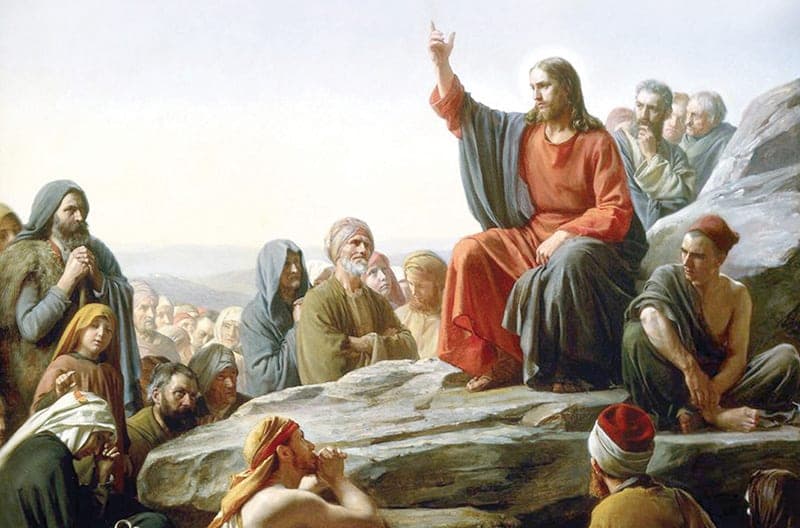As the Church walks through the great Sermon on the Mount in the Mass, we are all reminded of the way of love and the life that we are called to live as followers of the Lord Jesus.
It is an immense realization that Catholic Christians throughout the world – some 1.3 billion, or about 1/7 of our current human population – are hearing the summons of the Lord Jesus to avoid anger, refrain from harsh speech, show mercy, seek reconciliation, be of pure mind, labor for marital perseverance, dispense from empty vows, and fulfill the promises we have taken in this life.
Admittedly, this is a tall order. It so fundamentally summarizes the Christian way of life that the Sermon on the Mount was a part of the Church’s earliest teachings. It was hailed as the perfect summary of discipleship and healthy spiritual living by the early Christian believers.
Of course, the demands of the Sermon raise a serious question: Other than the Lord Jesus himself, who was True God and True Man, can anyone truly fulfill the call of the Sermon? Is the Sermon on the Mount nothing but a pipe dream that’s destined for failure?
For many people, the instigations of the Sermon can appear to be exercises in futility and a recipe for a crash-and-burn of the soul.
Is the Sermon only an ideal, something to be esteemed and valued, but approached with caution and a dose of skepticism? Is the Sermon on the Mount attainable and something that we can realistically fulfill in real life?
Truly, the Sermon is not merely a sentiment, nor an imaginary ideal floating in the ephemeral. It is a real sermon about real life. It is a direct commission of the Lord Jesus to the men and women who freely choose to follow him, imitate him, and continue his work on earth.
The Sermon cannot be separated from the trenches of life, with all its mire and muck. It is meant for human experience and points us to the realities of life.
But how? In a fallen world, how can such a way of life be taken seriously?
Saint Paul rightly teaches us that the moral law is a necessary tutor. The moral law is not an ideal, since it is not the conclusion of our efforts for goodness. The moral law admonishes, accuses, and convicts us of our sins. It is unrelenting.
The moral law, however, is not an end in itself. It serves a higher purpose. It properly bows to a nobler reality. The moral law is a plowing of the soul. It prepares our hearts for the workings of grace and the flourishing of virtue. The moral law plows and opens our souls for a conversion and transformation by God’s grace. Virtue and holiness are the reason and purpose for the moral law. They are its conclusion.
And so, the Sermon on the Mount points the soul to these realities and reminds it of its destiny. It allows the moral law to be spiritualized and manifest its true goal and purpose.
The Sermon on the Mount, therefore, is demanding, but it is also achievable by God’s grace. It is truly a roadmap for the Christian way of life, as Pope Francis explains: “So if anyone asks: ‘What must one do to be a good Christian?’ the answer is clear. We have to do, each in our own way, what Jesus told us in the Sermon on the Mount.”
In order for us to accept and fulfill this way of life, we have to allow the grace of God to work in us. God’s grace is nothing short of his very own life and power dwelling within us. God’s grace is given and fanned into a flame by the presence and activity of the Holy Spirit. And, Pope Francis tells us that we can only live the Sermon on the Mount “if the Holy Spirit fills us with his power and frees us from our weakness, our selfishness, our complacency and our pride.”
This is our task as we hear the Sermon on the Mount in the Mass. This is the invitation offered repeatedly to us by the Lord Jesus. Will we allow grace to work and for our higher natures to shine. Pope Francis encourages us: “Let us listen once more to Jesus, with all the love and respect that the Master deserves. Let us allow his words to unsettle us, to challenge us and to demand a real change in the way we live.”
Follow Father Jeffrey Kirby on Twitter: @fatherkirby
Crux is dedicated to smart, wired and independent reporting on the Vatican and worldwide Catholic Church. That kind of reporting doesn’t come cheap, and we need your support. You can help Crux by giving a small amount monthly, or with a onetime gift. Please remember, Crux is a for-profit organization, so contributions are not tax-deductible.















